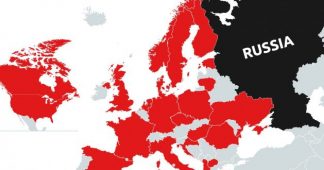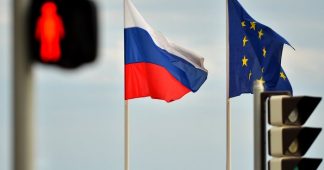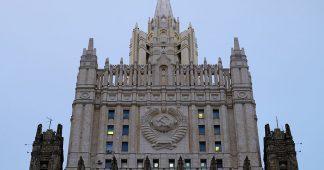By Johannes Stern
29 March 2018
While London and Washington continue to further incite tensions with Russia over the Skripal case, criticism is mounting within the European Union over the aggressive stance towards Moscow. In Germany in particular, leading politicians have spoken out in recent days against the accusations made by the British government and warned of the danger of an escalation of the situation up to and including a war.
On Wednesday, the former vice-president of the EU Commission, Günter Verheugen (Social Democrats, SPD), spoke during an interview with ZDF of “the beginning of a serious international crisis,” a crisis which he is unsure “can be kept under control.” And that is “really the last thing we need just now,” he added.
The crisis is not being set into motion on the basis of “secure knowledge and secure insights,” but “rather on the basis of a chain of evidence resting on one assumption after another.” This is not proof, he added, and stated that he thinks “such action in a democratic society is not possible.”
Asked by ZDF moderator Mitri Sirin about alleged Russian “misdeeds,” including “the annexation of Crimea,” the “war in Syria,” and “cyberattacks,” Verheugen answered, “In reality, there are no shortage of accusations that can be directed at the Russian side.” It is necessary “to be aware of the fact, however, that accusations can also be levelled at the West.”
It is “not so long ago that the British and American governments lied to the entire world: intentionally and consciously lied to justify the attack on Iraq.” And Britain’s Foreign Minister Boris Johnson, who is now “blowing so much hot air…lied so much during the Brexit campaign in Britain that it’s hard to keep up with him.” Verheugen added that “this is not particularly credible.”
Verheugen stated that he would have “wished a better start” for new Foreign Minister Heiko Maas (SPD), who immediately upon coming to office gave his full backing to Britain. While one has to “live with the situation for now,” it is also necessary to remember “that we previously had a different kind of cooperation with Russia.” As someone who “spoke directly” with President Putin about the eastward expansion of the EU, Verheugen commented that he knew that “constructive engagement and cooperation are possible.” It is necessary to “back away from this confrontation and return to a situation where cooperation is possible.”
Leading representatives of various parties in parliament spoke along similar lines and criticised the government’s position. “The expulsion of four Russian diplomats with an intelligence background was premature and is not justified by the political criteria that should be applied in the Skripal case,” said SPD deputy parliamentary group leader Rolf Mützenich to Die Welt. Obviously, not “every European government participated in this step.”
Left Party European policy spokesman Andrej Hunko thanked on Twitter “the EU-States Belgium, Bulgaria, Greece, Ireland, Luxemburg, Malta, Austria, Portugal, Slovakia, Slovenia, Hungary and Cyprus” for “not following the irresponsible course of expelling Russian ambassadors without evidence.”
Left Party parliamentary group leader Sahra Wagenknecht wrote, “It is not solidarity to suspend constitutional principles and further escalate the already tense situation with Russia, but a lack of understanding.”
The far-right Alternative for Germany, which enjoys close ties to Russian nationalists, was also angered by the government’s move. Party leader Alexander Gaulland described it as “inappropriate to resort to such serious sanctions in the absence of hard facts and denounce the accused for not disproving the allegations.” The British government’s assertions that Russia was responsible for the attack are “yet to be proved.”
AfD deputy Hansjörg Müller, who sits on the parliamentary committee for economy and energy, described Maas as a “foreign policy dilettante,” who ought to be brought “before a court” for his decision.
The sharp reactions from certain quarters demonstrate that, notwithstanding the declaration of solidarity with Britain and the expulsion of four Russian diplomats, a faction exists within the ruling class that considers Russia to be a partner in the pursuit of the geostrategic and economic interests of German imperialism.
Former Foreign Minister Sigmar Gabriel (SPD), who repeatedly criticised the United States’ foreign policy during his time in office and advocated a lifting of sanctions on Russia, has continued to promote this approach after handing his position over to Maas.
Gabriel gave his first foreign policy speech as ex-foreign minister at an event for the 25th anniversary of the German-Russian Forum, which since its founding in 1993 has pushed for closer political, economic and cultural exchanges between the two countries.
Gabriel declared that “in these times bravery” is required “to advocate for good German-Russian relations.” He added that he knew that “the Russian interpretation” of the conflict in Ukraine is “entirely different” from “the German and Western European standpoint.” But it has to be “possible to gradually overcome these conflicts.” There is no point “of making mutual allegations in world politics without at the same time looking for ways to move forward,” said Gabriel. Russia is a “decisive partner” in resolving the Syrian conflict. It will not work without Russia, he concluded.
Gabriel did not conceal the fact that he considers the British and American provocations against Russia to be a threat to German interests. It is “absolutely unacceptable that energy policy is driven by the US view, towards a position where we should give up our decades-long energy partnership with Russia so that Germany and Europe can buy expensive American natural gas,” he complained. Instead, he appealed for the “retaining of visions, such as that of a free trade zone from Lisbon to Vladivostok.”
Washington and London are exploiting the Skripal affair to thwart precisely such a goal. They want at all costs to prevent Germany from establishing a European military alliance to pursue its economic interests independently of the United States and forming a trading bloc with Russia. The constant intensification of the sanctions regime is part of Washington’s efforts to subordinate Russia so as to consolidate US imperialist domination over the energy-rich Eurasian landmass.
Gabriel warned in his speech that the West’s actions have already brought the world to the brink of a nuclear conflict. He said he has been following “with great concern that also on the Russian side, the idea is emerging that the West and NATO are so superior with conventional weapons that new nuclear weapons are required. And that on the other side, NATO responds by renewing its demand for the development of new nuclear weapons in Europe.”
He therefore appealed “for a balanced German stance,” because “we all know that confrontations in the end result in the staging of conflict somewhere. When the confrontation takes place, it occurs on the territory of the German Federal Republic and Europe,” he warned.











